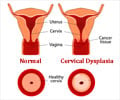A major Canadian study to improve cervical cancer detection has enrolled 33,000 women aged 25 to 65 to determine if pap smear, the traditional method of looking for cell abnormalities on the cervix, or testing for the presence of high-risk strains of HPV is more effective.
The study participants are to be divided into three groups. The first group of 11,000 participants will get the usual Pap test; the second group of 11,000 will get the HPV test and then be asked to return for screening in two years if no HPV is detected; the final 11,000 will get the HPV test and be screened in four years if no HPV is found. The difference in testing time periods will determine if HPV testing will allow for less frequent screening.Pap smear tests, involve scraping cells from the cervix so they can be examined for cellular abnormalities.
Cervical cancer is caused by any of a dozen strains of Human Papilloma Virus, a sexually transmitted virus (HPV), so researchers believe it might make more sense to screen for the virus rather than cellular changes that may lead to cervical cancer.
The Pap test is known to miss some cases of cancer prevalence. The HPV test, on the other hand sometimes is known to point to a cancer, when it is actually not. An earlier research done in Canada found that the HPV test gave a false reading of 6 per cent compared to 3 per cent for the Pap test.
In the case of pap smears, there are more chances of human error and subjectivity, which involve technologists examining samples for abnormal cells. The HPV test, on the other hand eliminates human error because it has a machine that detects the presence or absence of DNA for high-risk strains of HPV.
Regarding cost issues, the Pap test costs about $15, compared with $30 for HPV.
Advertisement
“The goal here is to do a better job of controlling the disease – to prevent as many women as possible from developing cervical cancer,” he added.
Advertisement
The Canadian Institutes of Health Research is funding the study. Bhagi Singh, scientific director of the Institute of Infection and Immunity of the Canadian Institutes of Health Research, said that though many experts already believe HPV testing is far superior to Pap testing, the issue needs to be probed thoroughly.
“For women, this is a very important question – in some cases, a matter of life or death,” he said. “What seems obvious may not be.”
According to Dr. Singh said, the research will also help determine whether the ideal testing method varies depending on age or ethnicity.
Janet Abe, a 38-year-old production manager at a Vancouver magazine, has volunteered to be part of the study as a student participant. She has been motivated to do so because both her parents have endured bouts of cancer in recent years.
“My family has been touched by cancer and the care was great so I wanted to give something back,” Janet Abe said. “This is one of the simplest things a woman can do because you don't even have to change your routine.”
Source-Medindia
THK/L











